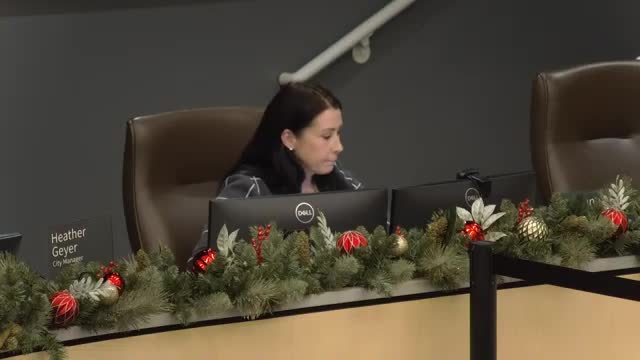Northglenn kicks off Section 36 subarea plan, council flags wastewater, regional coordination
Get AI-powered insights, summaries, and transcripts
Subscribe
Summary
City Council received the kickoff presentation for the Section 36 subarea plan, which covers parcels north of 168th Avenue and is largely slated in the 2023 comprehensive plan for industrial and commercial uses.
City Council on Monday received a staff presentation to start a subarea plan for Section 36, a roughly 464‑acre area north of 168th Avenue that the city says is largely slated for industrial and commercial uses under the 2023 comprehensive plan. Brooks Foboda, the city’s planning and development director, introduced the project and said consultants would use council direction to form alternatives and a preferred alternative.
The presentation by Blake Young of Kimley‑Horn described the site, ownership and outreach to date. Young said the site is largely agricultural now, contains the city’s water/wastewater facilities and includes ownership parcels held by the City of Northglenn (about 464 acres), Anadarko (about 134 acres), North Metro Fire Rescue District (about 14 acres), an LLC holding a small residential corner, and an RTD railroad right‑of‑way. He said the 2023 comprehensive plan had identified Section 36 as a top area of focus and that an initial market/conditions analysis is under way to be refined once council sets a vision and goals.
Council members asked for clarity on likely uses, constraints and next steps. Mayor Kristie Leidy and several council members said protecting the wastewater treatment plant and avoiding uses that would generate resident complaints or create safety conflicts were top priorities. Council Member Ilana Nowicki said the plant’s odor is a constraint and that uses requiring a residential buffer were not appropriate. Council Member Bob Burns and others said light industrial, warehouse/distribution, renewable energy (including solar), and storage/flex space were among uses they thought likely to work, while conventional retail or residential were flagged as poor fits.
Staff said a settlement agreement already prohibits residential development in at least part of the subarea, and Becky Smith, planning manager, told council the small residential corner is zoned agricultural and would require rezoning for industrial uses if a private owner pursued development. Foboda said stakeholder outreach has included North Metro Fire Rescue District, the City and County of Broomfield and the City of Thornton; he acknowledged Weld County had not yet been met and said a meeting with Weld County officials is planned.
Consultants and staff outlined the process: summarize existing conditions and the market, draft two alternative land‑use scenarios that meet council’s stated vision and goals, model fiscal impacts of alternatives, then return to council, the planning commission and the public for comment before identifying a preferred alternative and producing an implementation strategy. Young said the developable portion is roughly 350–400 acres and that city staff can provide “back‑of‑the‑napkin” comparisons of per‑acre revenue between industrial uses and a potential solar farm.
Council members asked about whether the city would keep, lease, or sell portions of the land, and staff said that will be a question for later in the process and one of the outcomes the alternatives will help the council weigh. Multiple council members asked that the plan explicitly consider transportation and access because Thornton currently owns the 168th Avenue right‑of‑way and will be a key stakeholder for site access. Foboda said the project team will coordinate with adjacent jurisdictions and with RTD regarding an end‑of‑line extension that consultants currently understand would terminate south of 168th, not through Section 36.
The council did not take formal action Monday. Staff said next steps include drafting vision and goals in January, completing the market analysis tied to those goals, producing two alternatives and fiscal analyses, and returning to the council and planning commission for further direction and public engagement.
For now, council direction centered on three points: preserve wastewater facility operations and avoid adjacent uses that could generate complaints; prioritize industrial, warehouse/distribution, light industrial/flex and renewable energy options as likely fits; and ensure early coordination with Thornton, Broomfield and Weld County on access and regional compatibility.
The study session item concluded with staff committing to schedule the additional stakeholder meetings and to return with the alternatives and fiscal analyses.
